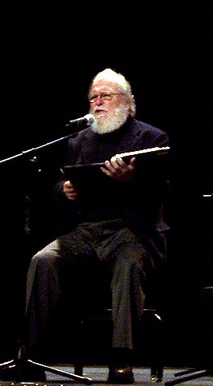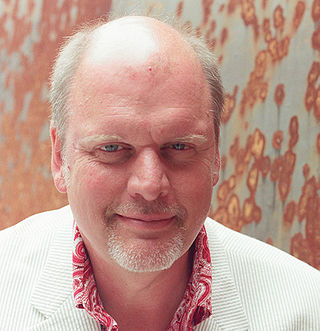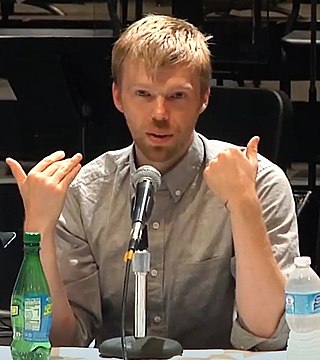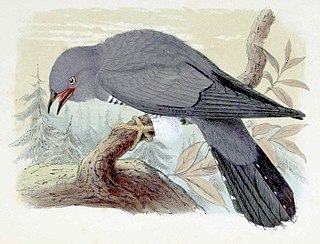Related Research Articles

Music is generally defined as the art of arranging sound to create some combination of form, harmony, melody, rhythm, or otherwise expressive content. Definitions of music vary depending on culture, though it is an aspect of all human societies and a cultural universal. While scholars agree that music is defined by a few specific elements, there is no consensus on their precise definitions. The creation of music is commonly divided into musical composition, musical improvisation, and musical performance, though the topic itself extends into academic disciplines, criticism, philosophy, psychology, and therapeutic contexts. Music may be performed or improvised using a vast range of instruments, including the human voice.

Peter Schickele is an American composer, musical educator, and parodist, best known for comedy albums featuring his music, but which he presents as being composed by the fictional P. D. Q. Bach. He also hosted a long-running weekly radio program called Schickele Mix.

Musical composition can refer to an original piece or work of music, either vocal or instrumental, the structure of a musical piece or to the process of creating or writing a new piece of music. People who create new compositions are called composers. Composers of primarily songs are usually called songwriters; with songs, the person who writes lyrics for a song is the lyricist. In many cultures, including Western classical music, the act of composing typically includes the creation of music notation, such as a sheet music "score", which is then performed by the composer or by other musicians. In popular music and traditional music, songwriting may involve the creation of a basic outline of the song, called the lead sheet, which sets out the melody, lyrics and chord progression. In classical music, orchestration is typically done by the composer, but in musical theatre and in pop music, songwriters may hire an arranger to do the orchestration. In some cases, a pop or traditional songwriter may not use written notation at all and instead compose the song in their mind and then play, sing or record it from memory. In jazz and popular music, notable sound recordings by influential performers are given the weight that written or printed scores play in classical music.
Sheet music is a handwritten or printed form of musical notation that uses musical symbols to indicate the pitches, rhythms, or chords of a song or instrumental musical piece. Like its analogs – printed books or pamphlets in English, Arabic, or other languages – the medium of sheet music typically is paper. However, access to musical notation since the 1980s has included the presentation of musical notation on computer screens and the development of scorewriter computer programs that can notate a song or piece electronically, and, in some cases, "play back" the notated music using a synthesizer or virtual instruments.

Olivier Eugène Prosper Charles Messiaen was a French composer, organist, and ornithologist who was one of the major composers of the 20th century. His music is rhythmically complex. Harmonically and melodically he employs a system he called modes of limited transposition, which he abstracted from the systems of material his early compositions and improvisations generated. He wrote music for chamber ensembles and orchestra, voice, solo organ, and piano, and experimented with the use of novel electronic instruments developed in Europe during his lifetime.

Juan Leovigildo Brouwer Mezquida is a Cuban composer, conductor, and classical guitarist. He is a Member of Honour of the International Music Council.
The Juilliard School, often abbreviated simply as Juilliard, is a private performing arts conservatory in New York City. Founded by Frank Damrosch as the Institute of Musical Art in 1905, the school later added dance and drama programs and became the Juilliard School, named after its principal benefactor Augustus D. Juilliard. Juilliard is one of the most prestigious performing arts schools in the world.

A composer is a person who writes music. The term is especially used to indicate composers of Western classical music, or those who are composers by occupation. Many composers are, or were, also skilled performers of music.
John Paul Corigliano Jr. is an American composer of contemporary classical music. His scores, now numbering over one hundred, have won him the Pulitzer Prize, five Grammy Awards, Grawemeyer Award for Music Composition, and an Oscar.

Ludwig van Beethoven's late string quartets are:
Lowell Liebermann is an American composer, pianist and conductor.

Michael Kevin Daugherty is an American composer, pianist, and teacher. He is influenced by popular culture, Romanticism, and Postmodernism. Daugherty's notable works include his Superman comic book-inspired Metropolis Symphony for Orchestra (1988–93), Dead Elvis for Solo Bassoon and Chamber Ensemble (1993), Jackie O (1997), Niagara Falls for Symphonic Band (1997), UFO for Solo Percussion and Orchestra (1999) and for Symphonic Band (2000), Bells for Stokowski from Philadelphia Stories for Orchestra (2001) and for Symphonic Band (2002), Fire and Blood for Solo Violin and Orchestra (2003) inspired by Diego Rivera and Frida Kahlo, Time Machine for Three Conductors and Orchestra (2003), Ghost Ranch for Orchestra (2005), Deus ex Machina for Piano and Orchestra (2007), Labyrinth of Love for Soprano and Chamber Winds (2012), American Gothic for Orchestra (2013), and Tales of Hemingway for Cello and Orchestra (2015). Daugherty has been described by The Times (London) as "a master icon maker" with a "maverick imagination, fearless structural sense and meticulous ear."
Jay "Bluejay" Greenberg is an American composer and former child prodigy who entered the Juilliard School in 2002 at age 10.
Hall Franklin Overton was an American composer, jazz pianist and music teacher.
Biomusic is a form of experimental music which deals with sounds created or performed by non-humans. The definition is also sometimes extended to include sounds made by humans in a directly biological way. For instance, music that is created by the brain waves of the composer can also be called biomusic as can music created by the human body without the use of tools or instruments that are not part of the body.
Paul Kim is an American classical pianist.
Mark Bucci was an American composer, lyricist, and dramatist. Influenced by Giacomo Puccini, his work is composed in a contemporary yet lyrical style, which frequently employs marked rhythms and memorable harmonies and melodies.
Valerie Capers is an American pianist and composer who is most well known for her contributions in jazz.

Andrew Norman is an American composer of contemporary classical music whose texturally complex music is influenced by architecture and the visual arts. His string trio The Companion Guide to Rome (2010), was a runner-up for the 2012 Pulitzer Prize for Music. While composer-in-residence for the Boston Modern Orchestra Project, he first gained international attention for the orchestral work Play (2013), which was nominated for the 2016 Grammy Award for Best Contemporary Classical Composition and won the 2017 Grawemeyer Award for Music Composition. He received another Grammy nomination for the orchestral work Sustain (2018), a commission from the Los Angeles Philharmonic. Other noted works include the fantasy for piano and orchestra Split (2015) and the opera A Trip to the Moon (2017). Since 2020, Norman has been on the composition faculty of the Juilliard School.

Birdsong has played a role in Western classical music since at least the 14th century, when composers such as Jean Vaillant quoted birdsong in some of their compositions. Among the birds whose song is most often used in music are the nightingale and the cuckoo.
References
- ↑ "Alexander Liebermann, composer, arranger, educator". alexanderliebermann.com. Retrieved November 22, 2023.
- 1 2 3 4 5 6 Faith Salie (April 30, 2023). "Calls of the wild: A composer transcribes bird songs". CBS News . Retrieved November 22, 2023.
- 1 2 Mundy, Charlotte (April 7, 2014). "Four World Premieres by Julliard Student Composers". New York Public Radio . Retrieved November 21, 2023.
- ↑ Ninety-Sixth Commencement (PDF). Manhattan School of Music. May 19, 2022. p. 16.
- 1 2 3 "Liebermann, Alexander". Juilliard School . Retrieved November 22, 2023.